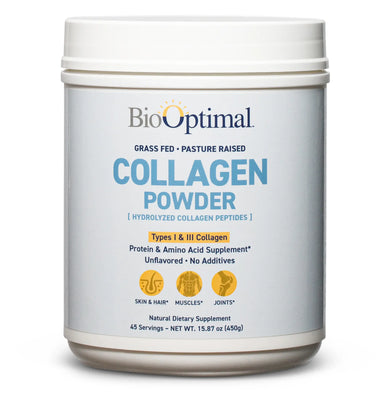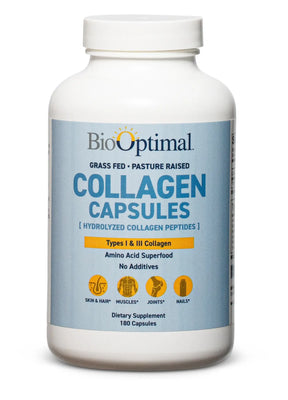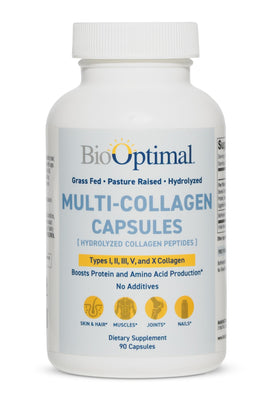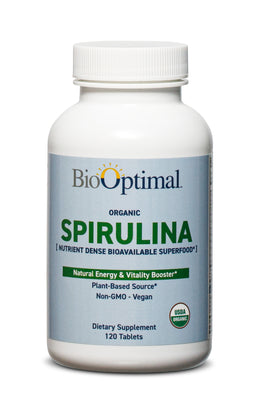Louis's takeaways:
Collagen powder is generally safe and beneficial, but in some cases, especially with high calcium content, poor hydration, or overconsumption, it may cause constipation or digestive discomfort. Choosing a high-quality hydrolyzed collagen, staying hydrated, and following the recommended dosage can help prevent side effects. Always consult a healthcare provider if you have pre-existing health conditions.
Table of Contents:
Collagen supplements have gained widespread popularity because they are generally beneficial for both genders and any age after adolescence. However, like any other dietary supplement, collagen must be consumed at the correct dosage to maximize its benefits. A common question for beginners is, “Does collagen powder cause constipation?”. The answer to this is ambiguous and dependent on many different factors. Age, lifestyle, and pre-existing health conditions are some of the primary factors that can lead to adverse effects of collagen consumption. Especially those who have digestive disorders and stomach troubles are more vulnerable to such issues.

Let us explore in depth whether collagen powder causes constipation and, if so, how to take preventive measures and reap the maximum benefit of these supplements.
Does Collagen Cause Constipation?
One cannot make a blanket statement about whether collagen powder causes constipation, as many factors contribute to the health issue. Collagen may or may not be added to the list. While it does not contribute to constipation in most cases, there are isolated cases where bowel problems are a chronic side effect*.
Collagen supplements with high calcium concentrations often lead to problems like constipation. Pre-existing health and digestive issues can also trigger constipation when the supplements are included in your diet. Certain collagen supplements are made from shellfish, shark cartilage, and other marine sources, which are rich in calcium, making them more difficult to digest than regular collagen supplements.
Another trigger for constipation is the overconsumption of supplements. Even though these supplements are generally made with hydrolyzed collagen peptides, consuming them in excess will make them difficult to digest. Keeping a check on your regular diet alongside the supplements is another way to prevent constipation.
SUMMARY:
Collagen doesn't typically cause constipation, but in some cases—especially when high in calcium or taken in excess—it may contribute to digestive issues. Pre-existing conditions and poor dietary balance can also increase the risk.
Other Side Effects* Of Collagen

Collagen supplements generally enjoy widespread acceptance, though they do have side effects*. Collagen supplements can also cause several other discomforts besides bloating and constipation, though rare.
Allergic reactions
Individuals allergic to shellfish and seafood may react to collagen supplements containing these ingredients. Rashes and mild allergic breakouts after taking the supplement are clear indications. In such cases, choosing a different product that does not contain shellfish and other marine-based ingredients is crucial. Always check the dietary benefits and ingredient lists to prevent such health troubles.
Diarrhea
Another side effect* of collagen supplements is diarrhea. However, this may also happen if you over-consume the product. When the body cannot process the collagen proteins efficiently, the bowel problems get triggered. If you need to rush to the bathroom after taking the supplement, it indicates that the supplement caused the problem.
Interaction with other drugs
Those who take regular medications for any pre-existing conditions may experience side effects* caused by collagen consumption. The best way to avoid this problem is to consult a doctor before starting the supplement to learn the potential side effects* in your case. Collagen may act as a barrier against certain medications and prevent them from being absorbed fully in your stomach.
Kidney stones
This is a rare side effect* that occurs only in isolated cases. Generally, it results from over consumption of certain types of collagen. Taking supplements high in calcium oxalate in excess for an extended period can lead to this health issue. The best preventive measure is choosing a supplement from a reputed brand that discloses the ingredients clearly. Also, ensure you take it only in the recommended dosage.
SUMMARY:
Though rare, collagen supplements can cause side effects like allergic reactions, diarrhea, drug interactions, and kidney stones—especially when overconsumed or containing marine-based or high-calcium ingredients. Always check labels and consult a doctor before use.
How Can Digestive Disorders Caused By Collagen Supplements Be Prevented?
The basic and most effective way to prevent side effects* is to take the supplements in the right amount. It is wiser to consult a doctor before you start taking the supplements to understand their suitability for you.

Go through the product's ingredients list thoroughly and also understand the preparation process. A well-researched product from a reputed brand would be a worthy investment in your health.
It is also important to understand who has limitations in consuming collagen supplements. Generally, they are not recommended during pregnancy. However, for certain users with chronic health issues like diabetes or gastrointestinal troubles, the supplement may be included on a case-to-case basis. Those allergic to bones and shellfish should also refrain from collagen supplements made from marine ingredients.

So, does collagen powder cause constipation or any other digestive disorder? Yes and no—it all comes down to choosing the right product and limiting the intake to the right dosage.
SUMMARY:
Digestive disorders from collagen supplements can be prevented by choosing high-quality products, sticking to the recommended dosage, and consulting a doctor—especially for individuals with allergies, pregnancy, or chronic conditions. Proper usage minimizes the risk of issues like constipation.
Safe Methods To Consume Collagen
Collagen supplements are available in powder, capsule, and tablet forms. All have similar ingredients. The safest way to consume any form of collagen is to take the recommended dose. Generally, the brand specifies the ideal dose, but you can also consult a nutritionist to determine the correct dosage based on your body weight and overall health conditions.
Wrapping Up
Too much of anything can lead to digestive troubles. It is crucial to limit consumption within the prescribed dosage, especially for anyone with constipation and other bowel troubles. Collagen supplements strengthen the bones and muscles. However, over-consumption can lead to several health problems, including bowel issues. Taking the right precautions, understanding pre-existing health conditions, and choosing the right product can help you get the maximum benefits out of them.
At BioOptimal, we offer a wide range of collagen supplements made from superior ingredients, making them suitable for everyone. Hydrolyzed collagen is much easier to digest, provided it is taken in the recommended dosage.
Disclaimer:
*For side effects - When in doubt, please contact a healthcare professional for medical advice.
FAQ
1. What is the correct daily dosage of collagen powder?
The appropriate daily dosage of collagen powder can vary based on the individual's age, health status, and desired health benefits. Generally, dosages can range from 5 to 15 grams per day. Clinical studies use approximately 10 grams of collagen daily for skin and joint health benefits. However, it's essential to follow the dosage recommendations on the product label or consult a healthcare provider to determine the best dosage for your specific needs.
2.Who may face digestive problems due to collagen?
Collagen supplement digestive problems are typically mild but can occur, especially in individuals with sensitive digestive systems or those who consume collagen on an empty stomach. Symptoms may include bloating, gas, and constipation. People with existing gastrointestinal conditions such as IBS (Irritable Bowel Syndrome) may also experience exacerbation of symptoms. Starting with a smaller dose and gradually increasing it can help minimize digestive issues.
3. What are the different types of collagen supplements?
Collagen supplements come in several forms, primarily categorized by their source and the type of collagen they contain:
- Type I: Found in bovine (cow), marine (fish), and porcine (pig) collagen, beneficial for skin, bones, and hair.
- Type II: Typically sourced from chicken, useful for joint and cartilage support.
- Type III: Often found alongside Type I in bovine collagen, supports skin, muscles, and blood vessels.
Supplements are available in various formats, including powders, capsules, and liquids, to suit different preferences and lifestyles.
4. Does collagen affect the intestine?
Collagen supplements are generally considered safe for the intestines and may even provide benefits. Collagen supports intestinal barrier function and may help manage leaky gut syndrome or other inflammatory gut conditions. However, as collagen is a protein, excessive intake without proper hydration can lead to constipation or other digestive discomforts. As always, it's advisable to consult with a healthcare provider before starting any new supplement regimen, especially if there are pre-existing digestive issues.











